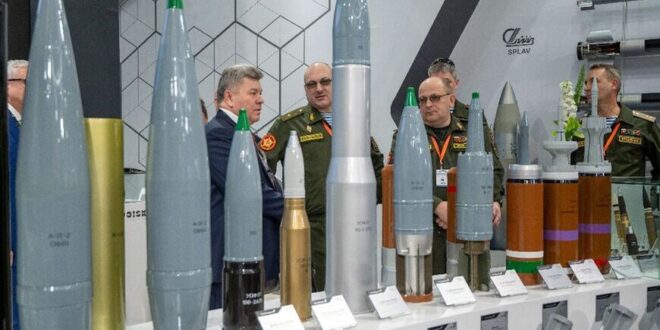The United Arab Emirates’ defense expenditure amounted to $22.5 billion last year and is expected to reach $28.6 billion by 2027.
Abu Dhabi’s biennial weapons exhibition generated billions of dollars in military product and technology agreements after the fifth and final day of the event on Friday, which saw both political allies and rivals showcasing their offerings in the neutral-standing UAE capital marketplace.
About $5.46 billion in total deals were signed during the first four days of the International Defense Exhibition (IDEX) and the Naval Defense Exhibition (NAVDEX) in 2023, according to the UAE’s government news agency WAM.
Over 1,300 exhibitors from 65 countries attended the Middle East and North Africa’s largest military expo, which has been welcoming a growing number of participants for 30 years.
Raking in the bulk of the deals at $5 billion by the end of the event was UAE state-owned military weaponry and related technologies conglomerate EDGE Group, also a strategic partner of the event.
Among its biggest deals was a more than $1 billion export deal with the Angolan navy to build and export a fleet of 71-meter corvette vessels, reported WAM.
Almost $2.5 billion was signed with the UAE armed forces for EDGE’s Thunder and Desert Sting 25 precision-guided munitions, amongst other technologies.
The UAE’s Ministry of Defense announced it will sign with China’s National Aero-Technology Import and Export Corporation (CATIC) to buy 12 L15 aircraft, with the option for 36 additional aircraft of the same type in the future.
Israel’s Ministry of Defense inaugurated its first-ever national pavilion on the first day of the event on Monday, according to its Ministry of Foreign Affairs.
More than 30 leading Israeli defense industries presented their technologies including air defense systems, rocket and missile systems, unmanned aerial systems and more.
Israel’s first-ever participation took place about two-and-a-half years after the signing of the Abraham Accords in September 2020, which normalized relations initially between Israel, the UAE and Bahrain.
Russia’s defense industry also had representatives at IDEX despite Western sanctions for its war on Ukraine, reported Bloomberg on the event’s first day.
The country in active war showcased more than 200 weapons from ammunition to air-defense systems and tanks, which Russian officials said had “already been tested in real combat conditions.”
Russia presented its latest Tor-M2 anti-aircraft missile system that is capable of wiping out drones and other complex aerial targets, reported state-owned news agency ITAR-TASS.
Alexander Mikhailov, head of the Military-Political Analysis Bureau, told the agency that international interest in his delegation’s work proved that Russia is a more reliable partner in military-technical cooperation than Western rivals are.
He added that Russia is selling military tech at lower prices and without geopolitical obedience.
The UAE’s defense expenditure amounted to $22.5 billion last year, according to the UAE Defense Market, Budget Assessment, Drivers, Market Trends 2022 report.
This amount is expected to reach $28.6 billion in 2027, with a compound annual growth rate of 4.8%.
The Emirati armed forces is strengthening its military capability to counter perceived threats such as Iran are major drivers of the growing defense budget, the report stated.
 Eurasia Press & News
Eurasia Press & News




